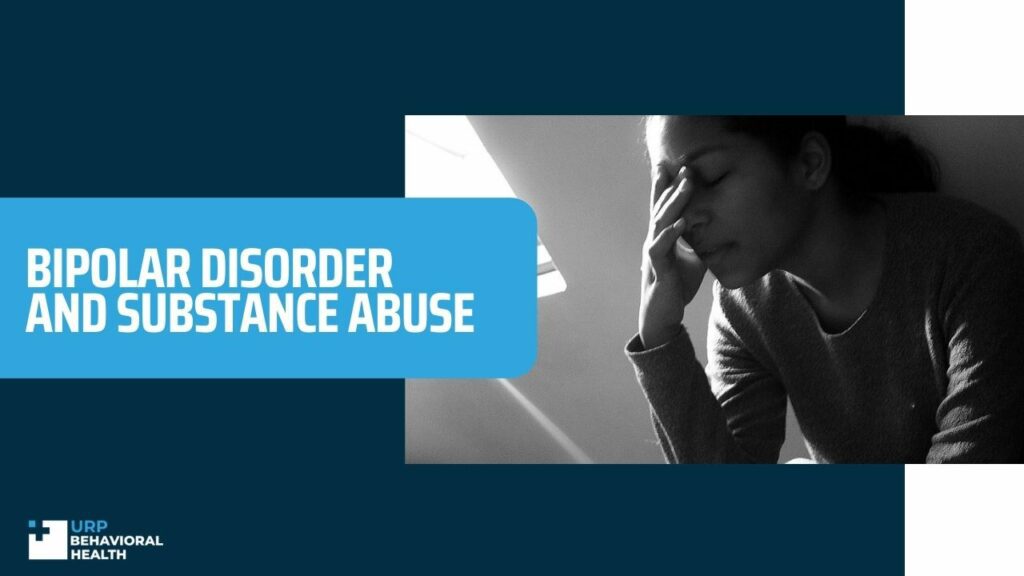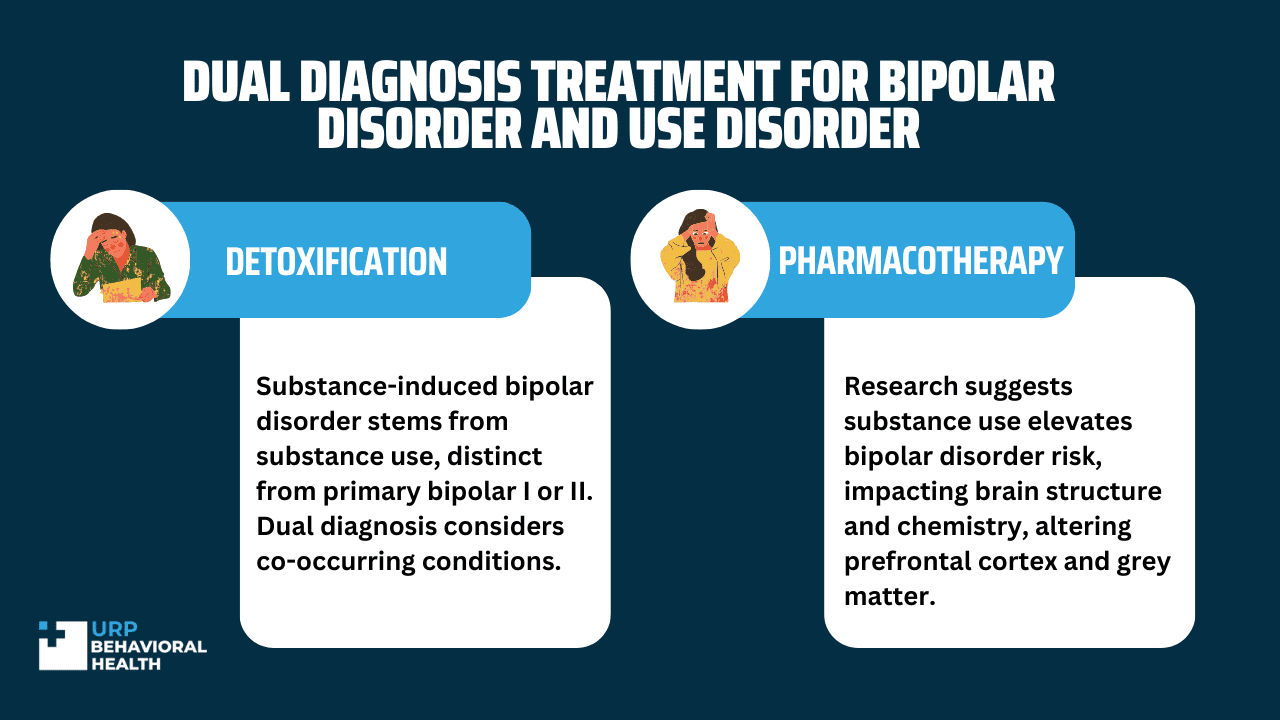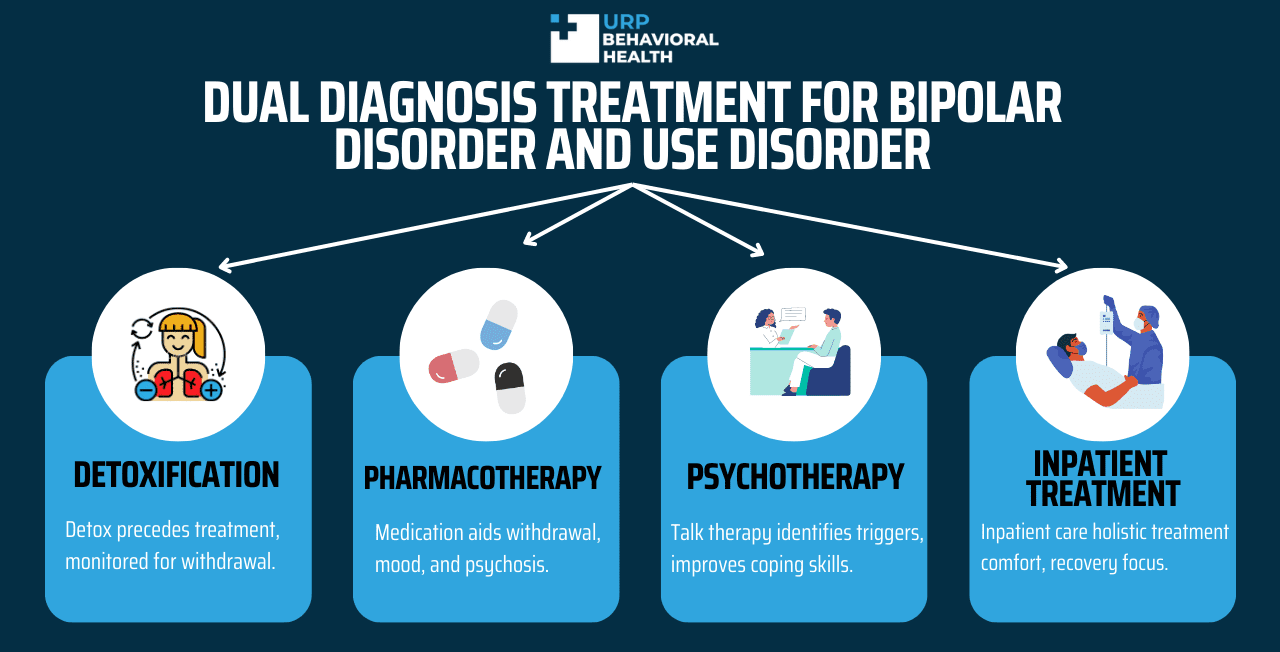Bipolar Disorder and Substance Abuse Treatment Center

When left untreated, bipolar disorder can increase the risk of poor life outcomes and injury. When bipolar disorder is combined with drug abuse, these problems are exacerbated. Substance induced bipolar disorder poses many problems for both the person and others. Therefore, it is important to consult a specialist in time.


Effects of Substance Abuse on Bipolar Disorder
Relationship Between Bipolar and Substance Abuse
The category of bipolar and related disorders also includes a diagnosis of substance-induced bipolar disorder. It’s characterized by a persistently elevated, expansive, or irritable mood. In this case, there is evidence that the mood disturbance developed due to substance intoxication or withdrawal and that the involved substance is capable of causing the symptoms.
There are specifiers to determine whether the symptoms are caused by alcohol, sedatives, cocaine, amphetamine, or other substances. This is a different diagnosis from bipolar I or II, which don’t occur as a result of substance abuse.
When evaluating symptoms, practitioners at URP Behavioral Health determine whether symptoms occur exclusively due to the effects of substance intoxication or withdrawal. If they occur consistently, regardless of substance abuse, you can receive a dual diagnosis for co-occurring bipolar disorder substance abuse.
Substance Abuse as a Risk Factor for Bipolar Disorder
A research review involving 22 studies shows that substance use is a risk factor for developing bipolar disorder. Moreover, studies indicate that alcohol and illicit substances such as methamphetamine, cocaine, and heroin alter the prefrontal cortex. Substance abuse also reduces grey matter volume in key brain areas.
The resulting changes in the brain’s chemistry and structure increase the risk of developing bipolar disorder.
Why Bipolar Disorder and Substance Use Disorder Co-Occur
One of the possible explanations for the co-occurrence is the self-medication hypothesis. It proposes that people with bipolar disorder use alcohol and illicit substances to alleviate emotional suffering. Also, the type of substance they take is specific to the emotional suffering they experience. Another theory is that they co-occur due to shared genetic factors that influence the risk for bipolar illness and substance use disorder.

Diagnosing Bipolar Disorder and Substance Abuse
Diagnosing Bipolar Disorder and Substance Abuse requires a comprehensive approach due to the overlapping symptoms of both conditions. A mental health professional conducts a detailed interview, assesses symptoms using DSM-5 criteria, and employs standardized assessment tools. Physical exams and lab tests are conducted to rule out other conditions. Continuous monitoring and adjustments to the diagnosis and treatment plan ensure effective management of both disorders, leading to better outcomes and improved quality of life.
Dual Diagnosis Treatment For Bipolar Disorder and Substance Use Disorder in URP Behavioral Health
Detoxification
Before you can start the treatment process, you need to stop using the addictive substance with a detox. During the detox period, your healthcare providers will monitor you throughout the day for a whole week so you can wean off the substance and alleviate the effects of withdrawal.
Pharmacotherapy
Your mental healthcare provider will prescribe you medication to alleviate the effects of withdrawal and addiction. Medication for addiction treatment will reduce the intensity of cravings and subsequent withdrawal symptoms. The medication you’ll be prescribed will vary depending on the substance you’ve been taking.
Your psychiatrist will also prescribe mood stabilizers for your bipolar mental diseaser. These can prevent mood disturbances, so you feel calmer and are more receptive to therapy. If you experience psychotic symptoms during manic episodes, your doctor will recommend antipsychotics as well.
Psychotherapy
Also known as talk therapy, this involves identifying and changing unhelpful thoughts and behaviors with help from a licensed practitioner. Over the course of these sessions, your therapist can adopt different approaches.
The most common for bipolar disorder is cognitive behavioral therapy, which is based on the concept that your thoughts, feelings, and behaviors are interconnected. That means certain thoughts and subsequent feelings result in manic symptoms and substance abuse. Therefore, changing the way you think can ultimately improve your behavior.
During these sessions, you’ll work with your therapist to identify what triggers your manic and depressive episodes. These could be certain events or situations, and how you feel about those events is what causes your behavior. Your therapist will help you develop coping strategies so you can respond to these feelings in a healthy way. They’ll also work on techniques that alleviate your manic symptoms and improve your functioning.
Inpatient Treatment
Inpatient treatment facilities offer holistic care for people with co-occurring bipolar disorder and substance use disorder. So, in addition to offering pharmacotherapy and psychotherapy, they also provide wellness treatments like meditation, therapeutic massage, and animal-assisted therapy. The purpose of such treatments is to promote relaxation and enhance a sense of well-being.
At the same time, you’ll stay in a comfortable facility equipped with various amenities, away from stressful situations and potential triggers. Amenities include balanced meals, private accommodation, fitness equipment, and recreational activities. After all, inpatient plans aren’t just designed to treat your disorder but to help you recover and improve your quality of life.
Conclusion
Bipolar disorder and substance use disorder can co-occur due to various reasons like self-medication or a genetic risk factor. Nevertheless, early diagnosis and treatment can increase your chances of positive outcomes. To make sure that you have a dual diagnosis, your mental health practitioner will determine whether you meet the criteria for both disorders. And with the right course of treatment in URP Behavioral Health center an inpatient program, you heal in a calm environment that’s conducive to recovery.
Let Us Guide You Towards Healing
We know that seeking treatment can be overwhelming, but our staff is here to make the process as smooth as possible. We’re available 24/7 to address any questions or concerns you may have.

